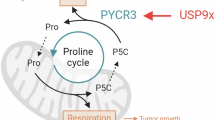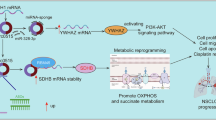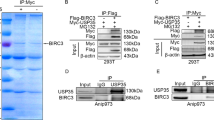Abstract
Hypoxia is a common phenomenon in the microenvironment of solid tumors; mitochondria, as the site of cellular oxidative respiration, are among the first organelles to be affected under hypoxic conditions. Mitochondrial cristae organizing protein 19 (MIC19), a core component of the mitochondrial contact site and cristae organizing system (MICOS), is essential for preserving mitochondrial activity. In this study, we investigated the effects of hypoxia on MIC19 and its regulatory mechanisms in non-small cell lung cancer (NSCLC). We showed that the expression levels of MIC19 were significantly increased in NSCLC, which were associated with advanced stages and a poor prognosis in patients with NSCLC. We demonstrated that MIC19 promoted the proliferation and invasion of A549 and PC9 cells in vitro, and MIC19 played a crucial role in maintaining mitochondrial function. We revealed that USP3 mediated the hypoxia-induced upregulation of MIC19 expression in A549 and PC9 cells. In the hypoxic microenvironment, HIF-1α bound to the USP3 promoter region and promoted USP3 expression, which in turn stabilized MIC19 through K48-linked deubiquitination, thereby driving NSCLC progression. The role of MIC19 in NSCLC growth and progression was confirmed in nude mice bearing A549 xenograft tumors in vivo. In conclusion, under hypoxic conditions, USP3 stabilizes MIC19 through deubiquitination, thereby promoting NSCLC progression. This study reveals the HIF1α–USP3–MIC19 axis in NSCLC progression, providing a theoretical basis for future therapeutic strategies.
This is a preview of subscription content, access via your institution
Access options
Subscribe to this journal
Receive 12 print issues and online access
$259.00 per year
only $21.58 per issue
Buy this article
- Purchase on SpringerLink
- Instant access to the full article PDF.
USD 39.95
Prices may be subject to local taxes which are calculated during checkout








Similar content being viewed by others
Data availability
Supplementary information is available at the website of Acta Pharmacologica Sinica.
References
Molina JR, Yang P, Cassivi SD, Schild SE, Adjei AA. Non-small cell lung cancer: epidemiology, risk factors, treatment, and survivorship. Mayo Clin Proc. 2008;83:584–94.
Wu H, Chen Q. Hypoxia activation of mitophagy and its role in disease pathogenesis. Antioxid Redox Signal. 2015;22:1032–46.
Dengler VL, Galbraith M, Espinosa JM. Transcriptional regulation by hypoxia inducible factors. Crit Rev Biochem Mol Biol. 2014;49:1–15.
Ning W, Yang J, Ni R, Yin Q, Zhang M, Zhang F, et al. Hypoxia induced cellular and exosomal RPPH1 promotes breast cancer angiogenesis and metastasis through stabilizing the IGF2BP2/FGFR2 axis. Oncogene. 2025;44:147–64.
Liu Y, Zhang H, Liu Y, Zhang S, Su P, Wang L, et al. Hypoxia-induced GPCPD1 depalmitoylation triggers mitophagy via regulating PRKN-mediated ubiquitination of VDAC1. Autophagy. 2023;19:2443–63.
Li L, Liu D, Chen T, Wei C, Qiao Y, Liu W, et al. Hypoxia-enhanced YAP1-EIF4A3 interaction drives circ_0007386 circularization by competing with CRIM1 pre-mRNA linear splicing and promotes non-small cell lung cancer progression. J Exp Clin Cancer Res. 2024;43:200.
Wu D, Chen T, Zhao X, Huang D, Huang J, Huang Y, et al. HIF1alpha-SP1 interaction disrupts the circ-0001875/miR-31-5p/SP1 regulatory loop under a hypoxic microenvironment and promotes non-small cell lung cancer progression. J Exp Clin Cancer Res. 2022;41:156.
Spinelli JB, Haigis MC. The multifaceted contributions of mitochondria to cellular metabolism. Nat Cell Biol. 2018;20:745–54.
Miao Y, Wang W, Dong Y, Hu J, Wei K, Yang S, et al. Hypoxia induces tumor cell growth and angiogenesis in non-small cell lung carcinoma via the Akt-PDK1-HIF1alpha-YKL-40 pathway. Transl Cancer Res. 2020;9:2904–18.
Meng L, Yang X, Xie X, Wang M. Mitochondrial NDUFA4L2 protein promotes the vitality of lung cancer cells by repressing oxidative stress. Thorac Cancer. 2019;10:676–85.
Darshi M, Mendiola VL, Mackey MR, Murphy AN, Koller A, Perkins GA, et al. ChChd3, an inner mitochondrial membrane protein, is essential for maintaining crista integrity and mitochondrial function. J Biol Chem. 2011;286:2918–32.
Sakowska P, Jans DC, Mohanraj K, Riedel D, Jakobs S, Chacinska A. The oxidation status of Mic19 regulates MICOS assembly. Mol Cell Biol. 2015;35:4222–37.
Meng Z, Cheng S, Wang W, Wei Z, Guo Z, Zhao X, et al. Up-regulation of MIC19 promotes growth and metastasis of hepatocellular carcinoma by activating ROS/NF-kappaB signaling. Transl Oncol. 2024;42:101906.
Zhao C, Xu Z, Que H, Zhang K, Wang F, Tan R, et al. ASB1 inhibits prostate cancer progression by destabilizing CHCHD3 via K48-linked ubiquitination. Am J Cancer Res. 2024;14:3404–18.
Popovic D, Vucic D, Dikic I. Ubiquitination in disease pathogenesis and treatment. Nat Med. 2014;20:1242–53.
Li A, Wang S, Nie J, Xiao S, Xie X, Zhang Y, et al. USP3 promotes osteosarcoma progression via deubiquitinating EPHA2 and activating the PI3K/AKT signaling pathway. Cell Death Dis. 2024;15:235.
Liang RP, Zhang XX, Zhao J, Zhu RT, Wang WJ, Lu QW, et al. Ubiquitin-specific protease 3 facilitates cell proliferation by deubiquitinating pyruvate kinase L/R in gallbladder cancer. Lab Invest. 2022;102:1367–76.
Wu X, Liu M, Zhu H, Wang J, Dai W, Li J, et al. Ubiquitin-specific protease 3 promotes cell migration and invasion by interacting with and deubiquitinating SUZ12 in gastric cancer. J Exp Clin Cancer Res. 2019;38:277.
Liao XH, Wang Y, Zhong B, Zhu SY. USP3 promotes proliferation of non-small cell lung cancer through regulating RBM4. Eur Rev Med Pharm Sci. 2020;24:3143–51.
Li XG, Zhu GS, Cao PJ, Huang H, Chen YH, Chen C, et al. Genome-wide CRISPR-Cas9 screening identifies ITGA8 responsible for abivertinib sensitivity in lung adenocarcinoma. Acta Pharmacol Sin. 2025;46:1419–32.
Perillo B, Di Donato M, Pezone A, Di Zazzo E, Giovannelli P, Galasso G, et al. ROS in cancer therapy: the bright side of the moon. Exp Mol Med. 2020;52:192–203.
Liu J, Yao L, Zhang M, Jiang J, Yang M, Wang Y. Downregulation of LncRNA-XIST inhibited development of non-small cell lung cancer by activating miR-335/SOD2/ROS signal pathway mediated pyroptotic cell death. Aging (Albany NY). 2019;11:7830–46.
Gao S, Chen T, Li L, Liu X, Liu Y, Zhao J, et al. Hypoxia-Inducible Ubiquitin Specific Peptidase 13 contributes to tumor growth and metastasis via enhancing the toll-like Receptor 4/Myeloid differentiation primary response gene 88/Nuclear Factor-kappaB pathway in hepatocellular carcinoma. Front Cell Dev Biol. 2020;8:587389.
Gu J, Xiao X, Zou C, Mao Y, Jin C, Fu D, et al. Ubiquitin-specific protease 7 maintains c-Myc stability to support pancreatic cancer glycolysis and tumor growth. J Transl Med. 2024;22:1135.
Zhang L, Xu J, Zhou S, Yao F, Zhang R, You W, et al. Endothelial DGKG promotes tumor angiogenesis and immune evasion in hepatocellular carcinoma. J Hepatol. 2024;80:82–98.
Yoshioka K, Nakagawa R, Nguyen CLK, Suzuki H, Ishigaki K, Mizuno S, et al. Proximity-dependent biotinylation reveals an interaction between ubiquitin-specific peptidase 46 and centrosome-related proteins. FEBS Open Bio. 2025;15:151–64.
Sahoo G, Bandyopadhyay S, Tripathi E, Karyala P. Deubiquitinating enzymes in breast cancer: in silico analysis of gene expression and metastatic correlation. J Biomol Struct Dyn. 2024;13:1–10.
Wang G, Dai S, Chen J, Zhang K, Huang C, Zhang J, et al. USP19 potentiates autophagic cell death via inhibiting mTOR pathway through deubiquitinating NEK9 in pancreatic cancer. Cell Death Differ. 2025;32:702–13.
Lancini C, van den Berk PC, Vissers JH, Gargiulo G, Song JY, Hulsman D, et al. Tight regulation of ubiquitin-mediated DNA damage response by USP3 preserves the functional integrity of hematopoietic stem cells. J Exp Med. 2014;211:1759–77.
Shen K, Zhang Q. Literature review: nuclear factor kappa B (NF-kappaB) regulation in human cancers mediated by ubiquitin-specific proteases (USPs). Ann Transl Med. 2024;12:90.
Li S, Xiong S, Li Z, Yang L, Yang H, Xiong J, et al. USP3 promotes DNA damage response and chemotherapy resistance through stabilizing and deubiquitinating SMARCA5 in prostate cancer. Cell Death Dis. 2024;15:790.
Wu X, Wang H, Zhu D, Chai Y, Wang J, Dai W, et al. USP3 promotes gastric cancer progression and metastasis by deubiquitination-dependent COL9A3/COL6A5 stabilisation. Cell Death Dis. 2021;13:10.
Shi K, Zhang JZ, Yang L, Li NN, Yue Y, Du XH, et al. Protein deubiquitylase USP3 stabilizes Aurora A to promote proliferation and metastasis of esophageal squamous cell carcinoma. BMC Cancer. 2021;21:1196.
Qin W, Steinek C, Kolobynina K, Forne I, Imhof A, Cardoso MC, et al. Probing protein ubiquitination in live cells. Nucleic Acids Res. 2022;50:e125.
Lange SM, Armstrong LA, Kulathu Y. Deubiquitinases: from mechanisms to their inhibition by small molecules. Mol Cell. 2022;82:15–29.
Cheung EC, Vousden KH. The role of ROS in tumour development and progression. Nat Rev Cancer. 2022;22:280–97.
Tuli HS, Kaur J, Vashishth K, Sak K, Sharma U, Choudhary R, et al. Molecular mechanisms behind ROS regulation in cancer: A balancing act between augmented tumorigenesis and cell apoptosis. Arch Toxicol. 2023;97:103–20.
Wang Y, Qi H, Liu Y, Duan C, Liu X, Xia T, et al. The double-edged roles of ROS in cancer prevention and therapy. Theranostics. 2021;11:4839–57.
Murphy MP. Mitochondrial dysfunction indirectly elevates ROS production by the endoplasmic reticulum. Cell Metab. 2013;18:145–6.
Acknowledgements
This work was supported by National Natural Science Foundation of China (82473191, 82072595, and 82172569). Natural Science Foundation of Tianjin (23JCZDJC00710, 23JCYBJC01010). Tianjin Health Science and Technology Project (TJWJ2022XK005). Beijing Science and Technology Innovation Medical Development Fund grant (KC2023-JX-0288-PZ78).
Author information
Authors and Affiliations
Contributions
JC, WHZ, and HYL designed the research studies. WHZ, CD, HH, ZXZ, CYJ, YJW, ZXH, and GNW performed the experiments. YWL, HH, CD, and ZXZ analyzed data. WHZ, HH and JHL wrote the manuscript. JC provided financial support. HYL, YWL, and JHL supervised the project.
Corresponding authors
Ethics declarations
Competing interests
The authors declare no competing interests.
Additional information
Publisher’s note Springer Nature remains neutral with regard to jurisdictional claims in published maps and institutional affiliations.
Supplementary information
Rights and permissions
Springer Nature or its licensor (e.g. a society or other partner) holds exclusive rights to this article under a publishing agreement with the author(s) or other rightsholder(s); author self-archiving of the accepted manuscript version of this article is solely governed by the terms of such publishing agreement and applicable law.
About this article
Cite this article
Zhao, Wh., Huang, H., Ding, C. et al. USP3 stabilizes MIC19 by deubiquitination under hypoxic stress and promotes the progression of non-small cell lung cancer. Acta Pharmacol Sin 47, 391–403 (2026). https://doi.org/10.1038/s41401-025-01625-4
Received:
Accepted:
Published:
Version of record:
Issue date:
DOI: https://doi.org/10.1038/s41401-025-01625-4



